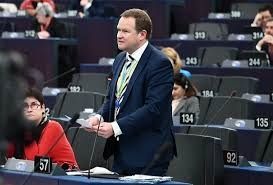|
|
TODAY.AZ / Politics
PACE at odds with Azerbaijan for several pro-Armenian politicians
27 August 2024 [16:37] - TODAY.AZ
 Elnur Enveroglu
Elnur Enveroglu
Founded in Europe in 1949, PACE is committed to the mission of promoting democracy, human rights, and the rule of law in Europe. The main institutions of the organization, which consists of 46 member states, include the Committee of Ministers (MC), the Parliamentary Assembly of the Council of Europe (PACE), the Commissioner for Human Rights, and the European Court of Human Rights (ECtHR).
But the question is does the PACE show loyalty to the organization's mission?
From January 2024, the Azerbaijani delegation decided to suspend cooperation with the Parliamentary Assembly of the Council of Europe and its participation in the organization for an indefinite period. Since then, relations between PACE and Azerbaijan have been suspended. The Western press reports that this decision was made after the calls of the European MPs to not accept the credentials of the members of the Azerbaijani delegation at PACE.
The Assembly came to the conclusion that official Baku did not fulfil its "main obligations" and adopted a resolution on this.
PACE claims that official Baku does not respect the democratic values ??based on the fundamental principles of the European Union. In addition to exhibiting a biased position in the post-Azerbaijan-Armenia conflict, the organization also tried to interfere in the internal affairs of official Baku. Citing "arrests and violations of human rights" within the country, PACE allegedly claims that Azerbaijan prevents freedom of speech.
It is easy to criticize and blame, but it is not every organization's job to be exemplary, is not it? It seems that either PACE cannot withstand those heavy "fundamental principles" that it has taken on as a mission, or there are serious problems within the organization.

For example, the presence of corrupt and pro-Armenian politicians like Frank Schwabe in PACE is a clear threat to Azerbaijan. Because Schwabe always grossly violates the principles of law with both his financial nterests and biased views.
We wonder how long Azerbaijan will have to turn a blind eye to the decisions made by pro-Armenian politicians of the European Union.
The anti-terrorist measures of September 19, 2023, left Europe in deep question. After all, until that time, some pro-Armenian politicians made promises to their partners.
But their promises did not come true. On the contrary, the political representatives of PACE, who tried to obstruct the work of the State Border Service at the Lachin border crossing point, tried to move towards the red line.
On January 22, 2024, the reason for the pain of PACE became clear.
PACE was not invited to the extraordinary presidential elections held in Azerbaijan on February 7, 2024. The reason was clear - what can an organization that does not want to include Azerbaijan and does not respect its territorial integrity do in the elections?
Eventually, the date is 2024 and the upcoming parliamentary elections in Azerbaijan did not want to see the PACE delegation in the elections again. Of course, this incident greatly disturbed the president of PACE, Theodoros Rousopoulos, of Greek origin. The PACE President has reacted to the announcement by the Foreign Minister of Azerbaijan that certain members of the Parliamentary Assembly of the Council of Europe (PACE) will be considered as personae non gratae in the country. Azerbaijan's blacklisting of 76 PACE members, in fact, has had a serious impact on PACE. When PACE discriminated against Azerbaijan, it should have known that it would end like this. An organization that only unilaterally advocates for Armenia and disrespects the territorial integrity of the other side should now think: either to eliminate discrimination or to leave the leading state of the South Caucasus out of the loop, relying on the unfair approach of a few biased politicians.
URL: http://www.today.az/news/politics/252196.html
 Print version
Print version
Connect with us. Get latest news and updates.
See Also
- 20 January 2026 [14:24]
President Ilham Aliyev meets with President of Finland in Davos - 20 January 2026 [14:11]
President Ilham Aliyev meets with Prime Minister of Iraqi Kurdistan in Davos - 20 January 2026 [11:44]
President Ilham Aliyev interviewed by Euronews in Davos - 20 January 2026 [11:11]
History repeats itself, but Black January won't happen again - 19 January 2026 [15:21]
President Ilham Aliyev arrives in Switzerland to attend annual meeting of WEF - 19 January 2026 [12:12]
Why sanctions against Iran are hitting so hard ...Of Armenia - 19 January 2026 [11:11]
Where can you find doctors who could cure Dugin? - 19 January 2026 [10:10]
Armenia finally takes up the TRIPP project - the opposition is panicking again - 18 January 2026 [13:25]
President Ilham Aliyev paid tribute to 20 January martyrs [PHOTOS/VIDEO] - 17 January 2026 [22:50]
German media highlight Azerbaijan’s first gas deliveries to Germany and Austria
Most Popular
 German media highlight Azerbaijan’s first gas deliveries to Germany and Austria
German media highlight Azerbaijan’s first gas deliveries to Germany and Austria
 Trump reiterates claim of 'Russian threat' over Greenland, saying 'it is time'
Trump reiterates claim of 'Russian threat' over Greenland, saying 'it is time'
 Europe’s energy dilemma: misinformation, radical activism and truth about Azerbaijani gas
Europe’s energy dilemma: misinformation, radical activism and truth about Azerbaijani gas
 Trump invites Erdo?an to co-found Gaza Peace Council under UN-backed plan
Trump invites Erdo?an to co-found Gaza Peace Council under UN-backed plan
 Azerbaijan growing gas exports to Germany and Austria win for economy and diplomacy
Azerbaijan growing gas exports to Germany and Austria win for economy and diplomacy
 Syrian army seizes 2 oilfields from Kurdish factions
Syrian army seizes 2 oilfields from Kurdish factions
 EU and Mercosur bloc sign trade deal after years of troublesome negotiations
EU and Mercosur bloc sign trade deal after years of troublesome negotiations
